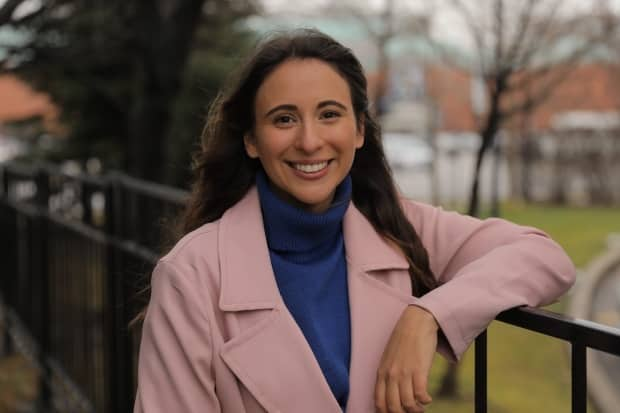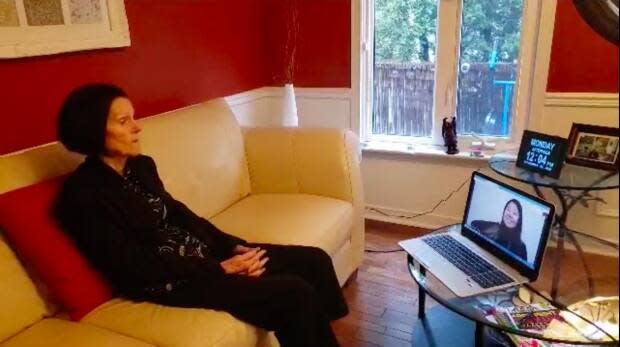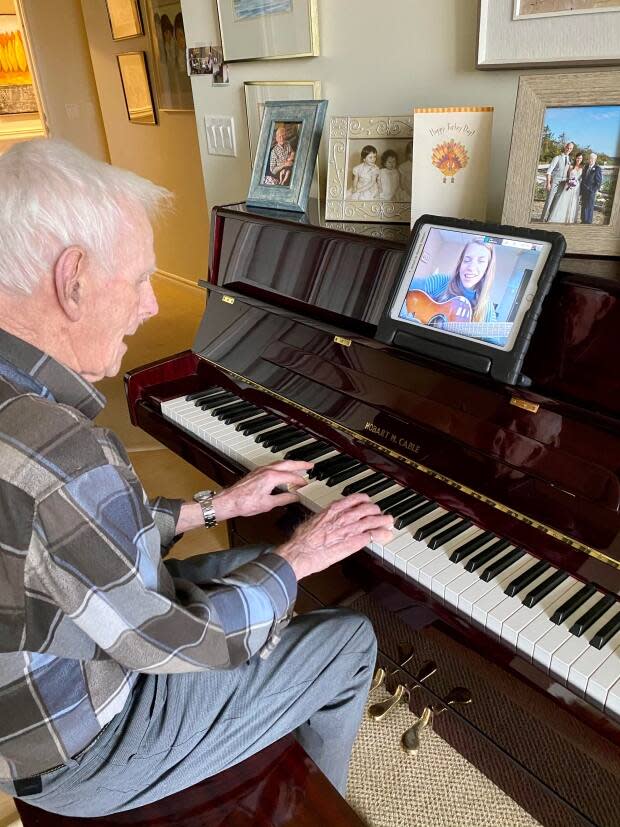Music therapy offering lifeline for isolated GTA seniors amid pandemic restrictions
When COVID-19 hit in March, 87-year-old Betty Sulewski was cut off from the regular daycare programs she'd come to enjoy, and the toll that took on her became visible to her family.
"Having that interaction with others and that stimulation was really critical," said Kathleen Biggs, Sulewski's daughter.
"We noticed that mom was really going downhill. So the communication skills almost stopped. You'd ask a question and the response is, 'I don't know.'"
Sulewski has dementia and lives with Biggs and her husband. The care program she used to attend had special group activities for those with dementia — including music therapy — and Biggs said they struggled to find alternate ways to keep her mother stimulated.
Biggs enrolled her mother in virtual one-on-one music therapy sessions, which have now become a regular part of the senior's routine. She said she notices a difference in her mother.

"To have her engaged through music … being present, it is wonderful. Because there really isn't anywhere that I can take her to give her this stimulation," said Biggs.
With no clear end in sight to physical distancing measures, some experts say as we head into the holidays, it's important for seniors to stay engaged and music therapy can offer a lifeline for those living with dementia.
Music therapists form a relationship with patients to accomplish set goals. For seniors living with dementia, some of those goals can be increasing socialization and enhancing self-awareness. Sessions might include singing a familiar song together, the playing of one or more instruments, improvisation or rhythmic activities.
In-person to iPad
Miya Music Therapy is one of the companies Biggs has been working with to keep her mother engaged. Since the start of the pandemic, Miya Adout, the company's founder and director, said she's seen an increase in demand for virtual sessions.
"A lot of families are calling us, and right now, especially, saying that their family members are very isolated," said Adout.
She and her team switched gears after care-home facilities and retirement homes went into lockdown during the first wave.
Though Adout said their services were deemed essential — they have two staff members who still conduct in-person music sessions — the vast majority of their sessions are now virtual, usually over a tablet.

"We're hearing from the children of our clients living with dementia a lot, saying that they're just so grateful during this time when they can't necessarily visit and spend time with their loved ones, that we're able to bring something to them that brings them joy and that improves their mood."
"We find that it also strengthens and develops the relationship and communication skills," said Amy Bouchard, life enrichment coordinator at Amica Bronte Harbour — a retirement home in Oakville. The home works with Miya Music Therapy to offer regular sessions for its residents.
"So we have some residents that are less verbal. And again, when we introduce [the music therapy instructor] into their session, they're singing loud and proud and we just find that music really, truly awakens their souls."

That rings true for Kathleen Biggs's mother Betty, who she said is more engaged after every session — remembering how many children she has and their names and seems to be more interested in activities.
"When you have someone who has dementia, it's hard to get a smile. And because I don't know what she's thinking about, a lot of the time it's very much a blank stare," said Biggs.
"I just find that through these sessions that at least for a period of time afterwards that I get a little bit of my mom back."
Good vibrations
According to Amy Clements-Cortes, an assistant professor at the University of Toronto, there is science behind the effect music can have on an individual.
"Music impacts our physiological processes — so it can influence and change our heart rate, our respiratory rate, our brain waves," said Clements-Cortes.

Clements-Cortes, who teaches in the music and health studies program, has conducted extensive research on the impact music has on patients — including vibroaccoustic therapy, which looks at how feeling vibration throughout the body might drive brain activity.
"From that pilot [study], after only six sessions of receiving the Rhythmic Sensory Stimulation Vibroacoustic treatment we did see that people that had Alzheimer's dementia had improved their scores on a cognitive test," she said.
"And also people seemed to be a little bit more clear that they were more talkative and had specific memories that they shared during the sessions."
Clements-Cortes said she's worked at long-term care facilities for years and that isolation can increase during the Christmas season — when programs and staffing are often cut down.

"It's already often a quieter time in long-term care settings and now impacted by all the restrictions of not having family or people not being able to go and have holiday time with their family when they would normally have been able to — I think that will further isolate," she said.
"I think music therapy is incredibly vital at this time."


